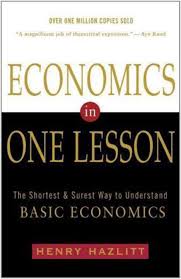Economics in One Lesson
If I could recommend one book for everyone to read to grasp the connection between economics and public policy, it would be Henry Hazlitt’s volume, Economics in One Lesson. It offers a basic, accessible explanation of why so many attempts to regulate the economy don’t work. Though laws are certainly necessary, the failure of many laws is due to a focus on the legislature’s immediate intentions rather than the long term impact of the proposed policy.
Though the book is not a theology of economics, its main thrust resonates with scriptural principles. The reader does not have to agree with all of Hazlitt’s policy preferences to recognize the value of his long-term view of the universal good and see how they help fulfill authentic justice.
Hazlitt’s One Lesson goes like this:
“The art of economics consists in looking not merely at the immediate but at the longer effects of any act or policy; it consists in tracing the consequences of that policy not merely for one group but for all groups.”
Basically, Hazlitt’s lesson boils down to two principles: 1) thinking about the long term good instead of the short term good and 2) taking everyone’s good into consideration. Both of these principles resonate with Scripture.
First, let’s look at taking the long view on economic decisions:
Some advocates of so-called social justice, including some Christians, argue that immediate action to change significant economic policies in order to provide a rapid solution to a perceived economic problem is necessary. In many of these cases, however, the long term impacts of the new policies are not fully considered.
Looking for long term consequences instead of focusing on short term effects is biblical.
For example, Proverbs 21:5 states: “The plans of the diligent lead surely to abundance, but everyone who is hasty comes only to poverty.” (ESV)
Interpreting Proverbs is a bit tricky since they are not absolute, universal laws, but general truths that may have apparent exceptions. However, without pushing this text beyond its primary meaning, it is clear that long term planning is being lauded by the author of this proverb.
For another example, consider Luke 14:28–30: “ For which of you, desiring to build a tower, does not first sit down and count the cost, whether he has enough to complete it? Otherwise, when he has laid a foundation and is not able to finish, all who see it begin to mock him, saying, ‘This man began to build and was not able to finish.’” (ESV)
The context of these verses is about the cost of discipleship, but Jesus is urging his audience to consider the long term costs of their discipleship, not just the apparent immediate benefit. That Christ uses an economic example to illustrate his spiritual point demonstrates the validity of the economic principle.
Second, the concept of the good of all, not just a favored group, should be considered:
Some Christians try to argue that social structures should be preferential toward the poor or others who have real or perceived disadvantages. For example, in the minds of some activists, social justice requires progressive taxation and redistribution of wealth in order to benefit the poor. The rising tide of socialism among the “young and woke” crowd seeks to confiscate and redistribute wealth according to their desired social order, which is intentionally designed to harm the rich (or those that they choose to label as such).
The Bible, on the other hand, indicates that social structures should be oriented toward even-handed justice. Consider Exodus 23:2–3: “You shall not fall in with the many to do evil, nor shall you bear witness in a lawsuit, siding with the many, so as to pervert justice, nor shall you be partial to a poor man in his lawsuit.” (ESV)
The passage then goes on to explain that you can’t passively ignore the good of your enemy by failing to return his lost property (vv. 4–5), that you should not lean toward the benefit of the rich against the poor in seeking justice (v. 6–8), and that the sojourner, the foreigner in your midst, should not be oppressed. Justice is the main theme.
As a second example, consider Proverbs 22:16: “Whoever oppresses the poor to increase his own wealth, or gives to the rich, will only come to poverty.” (ESV)
It is apparent that manipulating social structures for the benefit of a special interest group is not a path for universal justice. This means that creating a system that benefits the rich is bad (and this is a major danger of our current system of crony capitalism), but that attempting to punish the rich through taxation (as socialism tends to do) is also evil.
The basic thrust of these passages is that social systems, including economic systems, should be oriented toward even-handed justice.
Though more could be said about Hazlitt’s One Lesson, I have come to the conclusion that there is warrant for claiming that Hazlitt’s principles resonate with biblical justice. His examples help show why some of the well-intentioned policies proposed by so-called social justice advocates are really detrimental to a holistic system of justice.
It is important, therefore, that we begin to seek a system that does not intentionally harm one group for the benefit of another and that we look at long term consequences, including systemic incentives created by social programs or convoluted tax systems. Only when we begin to ask these important questions will we be able to find legitimate answers to them.











There’s no reason to doubt that Jesus was nailed to the cross. Ultimately, I trust what Scripture says about Jesus’s crucifixion because I also trust what it says about his resurrection. And that’s what we should be celebrating this week.